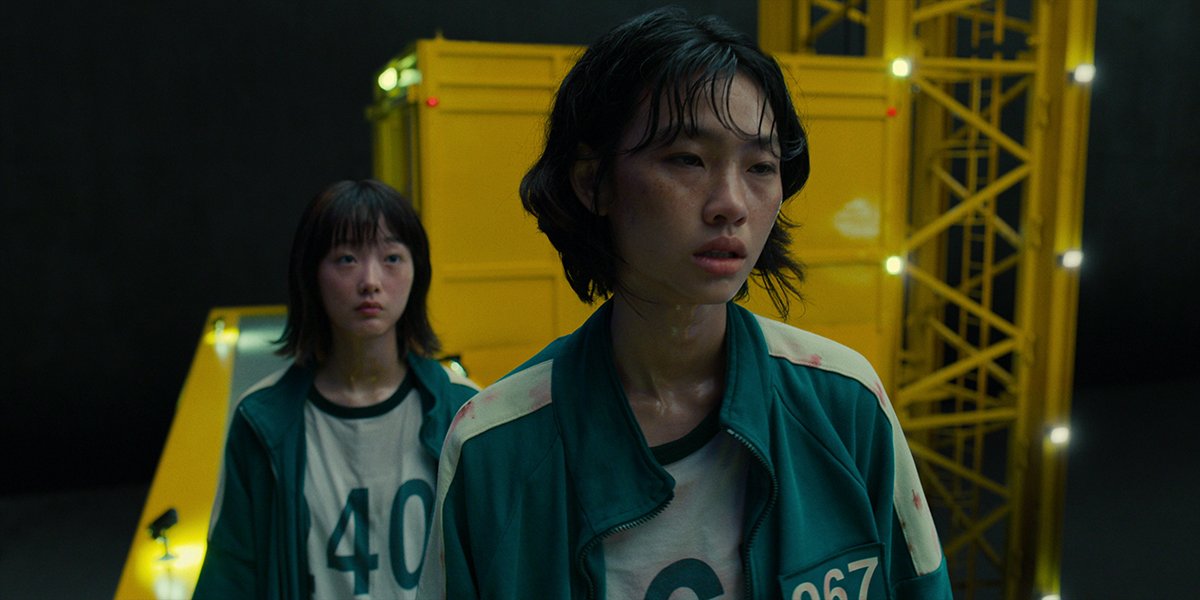
TV Writer Ellie Muston reviews the South Korean survival drama that’s taken the world by storm
How much would you be willing to give in order to settle your debts? Your life? Someone else’s? These are the questions posed by Hwang Dong-hyuk’s outrageous survival drama Squid Game, which premiered on Netflix back in September. The latest addition to what has been coined the ‘death game genre,’ Squid Game follows the likes of The Hunger Games and Battle Royale in its gripping depiction of desperate subjects at the mercy of their game’s hosts. The South Korean mini-series has taken the world by storm, reaching No.1 on the Netflix charts globally with 95% of viewers hailing from outside of Korea. Even if you haven’t yet watched the series yourself, you’ll have no doubt come across the numerous TikToks, memes and fan theories inspired by the hit show.
“Ultimately what is most devastating is the players’ subsequent willful participation in the savage and murderous games as they grow ever more desperate for success
Its central protagonist is Seong Gi-hun (Lee Jung-jae), a divorced chauffeur who finds himself in severe debt due to an unshakeable gambling addiction. When he encounters a wily salesman (Gong Yoo) whilst awaiting a train home, he finds himself lured into the enigmatic Squid Game in the hopes of being able to financially support his mother and estranged daughter. Finding himself as one of 456 who have likewise followed a similar pursuit, the players battle each other in a series of six classic childhood games to earn money towards their jackpot – tantalisingly kept in a glowing gold piggybank above their dormitories. The twist? Failure to complete the tasks and win the games results in ‘elimination’ (aka death). As the stakes get higher, we see our gang of antiheroes face complicated choices of betrayal, allyship and compassion in the bid to settle the debts which plague them.
The disjunction between Dong-hyuk’s gummy-bear sets of lurid pastels, Lego-like staircases and playground toys and the extreme gore and violence endured by the players makes the whole scene feel like a fever dream. And yet, arguably, what the show does best is it represents an uncomfortable closeness to reality by allegorising the prevalent experience of extreme wealth inequality under capitalism. When the players are granted the opportunity to vote on the continuation of the games, the markedly even divide in opinions reinforces the harsh reality of these games, as Player 322 notes ‘At least here I have hope,’ bringing their excruciating dilemma home – is it better to die with the hope of winning or to continue to live with no way out? Ultimately what is most devastating is the players’ subsequent willful participation in the savage and murderous games as they grow ever more desperate for success.
“Aside from its startling cinematography and set design, it is the core band of characters which viewers are most compelled by
Aside from its startling cinematography and set design, it is the core band of characters which viewers are most compelled by. United by their debt and desperation, Seong Gi-hun forms alliances with an unlikely troupe consisting of Ali Abdul (a migrant from Pakistan played by Anupam Tripathi), Cho Sang-woo (Gi-hun’s high school classmate played by Park Hae-soo), Kang Sae-byeok (a North Korean defector played by Jung Ho-yeon) and Oh Il-nam (a terminally ill elderly man played by O Yeong-su). Their camaraderie has a heart-wrenching effect as their loyalties to each other are tested and their capacity for empathy is set against the motivations that brought them there.
It is an unquestionably uncomfortable watch, as viewers’ own faith and loyalties are questioned by the narrative’s twists and turns, as well as our complicity in the players’ suffering through visual consumption being indicated (akin to that of the caricatured American VIPs). But the heart-stopping cliff-hangers rendered by Squid Game’s episodical nature and a genuine fear for what is coming next is what makes the series so utterly binge-worthy. Perhaps to an extent, it is predictable, as by the climax of the first episode we know that for the majority of the players it is not going to end well. However, it is the questions of how, why and for whom the events continue that make Squid Game so engrossing. In this age of extreme wealth divide and economic crisis with the one percent ruling the 99, Squid Game is an overt and bold representation of just how far humanity can go in dire need and that, ultimately, life is a game of luck.
Rating: 4.5/5
Want more TV drama in your life? Check out more Redbrick TV reviews here:

Comments